
Publisher:
Bonnie King
CONTACT:
Newsroom@Salem-news.com
Advertising:
Adsales@Salem-news.com

~Truth~
~Justice~
~Peace~
TJP
May-13-2011 03:39

 TweetFollow @OregonNews
TweetFollow @OregonNews
Dispossession and Exploitation: Israel's Policy in the Jordan Valley & Northern Dead Sea
Salem-News.comIsrael has used various means to take control of most of the land, water and tourism sites, restricting Arab movement and building.
 Greenhouses of settlements next to ‘Ein al-Bida, in the Jordan Valley. Photo: Eyal Hareuveni, B'Tselem, 23 March 2011. |
(JORDAN VALLEY, Occupied Palestine ) - The Jordan Valley and the northern Dead Sea area contains the largest land reserves in the West Bank. The area covers 1.6 million dunams, which constitute 28.8 percent of the West Bank.
Sixty-five thousand Palestinians, live in 29 communities, and an estimated additional 15,000 Palestinians reside in dozens of small Bedouin communities. Some 9,400 settlers live in the 37 settlements (including seven outposts) in the area.
Israel has instituted in this area a regime that intensively exploits its resources, to an extent greater than elsewhere in the West Bank, and which demonstrates its intention: de facto annexation of the Jordan Valley and the northern Dead Sea area to the State of Israel.
Taking control of land
Israel has used various means to take control of most of the land in the area, as follows:
* Thousands of dunams were taken from Palestinian refugees and used to build the first settlements there, beginning in 1968 and extending throughout the 1970s. This, in violation of a military order.
* By legal manipulation, Israel has enlarged the inventory of “state land” in the area, such that 53.4 percent of the area, four times greater than pre-1967, is now deemed state land.
* Israel has declared 45.7 percent of the area military firing zones, although they are situated next to main traffic arteries, alongside settlements’ built-up areas and farmland, or include land of settlements that is under cultivation.
* Israel has closed some 20 percent of the land by declaring them nature reserves, although only a small section of them has been developed and made suitable for visitors. Two-thirds of the nature reserves areas are also areas of military firing zones.
* Israel has seized lands in the northern Jordan Valley for the Separation Barrier and has placed 64 landmine fields near the route of the Jordan River. The army itself contends the landmines are no longer required for security purposes.
Using these means, Israel has taken control of 77.5 percent of the land and has prevented Palestinians from building on or using the land or remaining there. Twelve percent of the area has been allocated for settlements, including the entire northern shore of the Dead Sea.
Israel’s policy has cut up the Palestinian spatial sphere and isolated Palestinian communities in the area. In the last two years, the Civil Administration has repeatedly demolished structures in the area’s Bedouin communities, although some of them were established before 1967.
Taking control of water sources
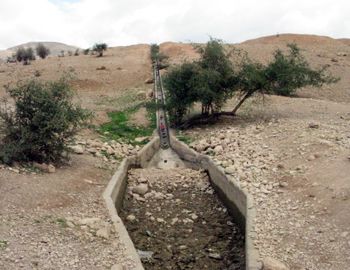 The dry ‘Ein Uja spring. Photo: Eyal Hareuveni, B'Tselem, 23 March 2011. |
Israel has taken control of most of the water sources in the area and has earmarked them for the almost exclusive use of the settlers.
Most Israeli water drillings in the West Bank – 28 of the 42 drillings – are located in the Jordan Valley. These drillings provide Israel with some 32 million m3 a year, most of which is allocated to the settlements.
The annual allocation of water to the area’s 9,400 settlers from the drillings, the Jordan River, treated wastewater, and artificial water reservoirs is 45 million m3. The water allocated to the settlements has enabled them to develop intensive-farming methods and to work the land year round, with most of the produce being exported.
The water allocation to the settlements is almost one-third the quantity of water that is accessible to the 2.5 million Palestinians living in the West Bank.
Israel’s control of the water sources in the area has caused some Palestinian wells drying up and has led to a drop in the quantity of water that can be produced from other wells and from springs. In comparison, in 2008, Palestinians pumped 31 million m3, which is 44 percent less than Palestinians produced in the area prior to the Israeli-Palestinian Interim Agreement of 1995.
Due to the water shortage, Palestinians were forced to neglect farmland that had been in cultivation and switch to growing less profitable crops. In the Jericho governorate, the amount of land used for agriculture is the lowest among the Palestinian governorates in the West Bank – 4.7 percent compared to an average of 25 percent in the other governorates.
Israel’s control of most of the land area also prevents equal distribution of water resources to the Palestinian communities in the area; it also prevents the movement of water to Palestinian communities outside the area.
Water consumption in Bedouin communities is equivalent to the quantity that the UN has set as the minimal quantity needed to survive in humanitarian-disaster areas.
Restrictions on movement
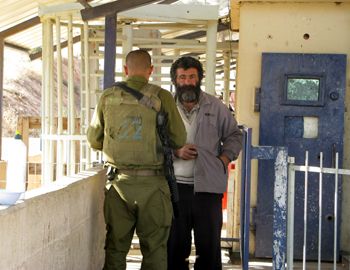 Tayasir Checkpoint, in the Jordan Valley. Photo: Keren Manor, |
In the framework of the easing of restrictions on movement in the West Bank that was carried out in 2009, Israel did not eliminate the movement restrictions in the Jordan Valley, despite the security calm in the area.
Israel still operates four checkpoints in the Jordan Valley:
* Tayasir,
* Hamra,
* Ma’ale Efrayim, and
* Yitav.
At these checkpoints, only Palestinian-owned vehicles that Israel recognizes as belonging to residents of the area are allowed to pass.
The restrictions on movement seriously impair Palestinian life, since most of the educational facilities and medical clinics that are supposed to serve the local residents are situated outside the area.
Restrictions on building
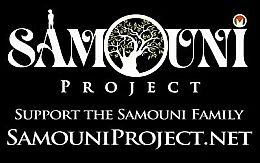 |
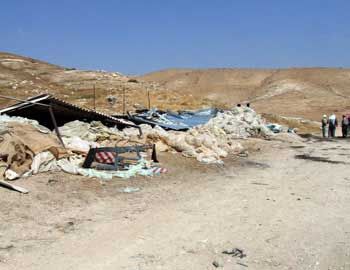 Huts demolished by the Civil Administration in al-Farsiya, in the Jordan |
Israel’s planning policy in the Jordan Valley makes it impossible for Palestinians to build and develop their communities.
The Civil Administration has prepared plans for only a tiny fraction of the Palestinian communities.
Furthermore, these plans are nothing more than demarcation plans, which do not allocate land for new construction and development.
For example, the plan for al-Jiftlik, the largest community in Area C (the area that is under complete Israeli control), left 40 percent of the built-up area of the village outside its borders.
As a result, the houses of many families are in danger of demolition.
The plan for al-Jiftlik is smaller in land area than the plan issued for the Maskiyyot settlement, although al-Jiftlik has 26 times as many residents.
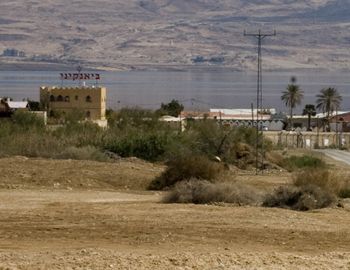 Israeli bathing beach Bianqini, on the northern Dead Sea. |
Taking control of tourist sites
Israel has taken control of most of the prominent tourist sites in the area.
These include the northern shore of the Dead Sea, Wadi Qelt, the Qumran caves, the springs of the ‘Ein Fashkha reserve, and the Qasr Alyahud site (where John the Baptist baptized Jesus).
Israeli entities administer these sites. Israel also limits tourist access to Jericho, channeling tourists to the southern entrance to the city.
As a result, few tourists visiting Jericho city spend the night there, resulting in heavy losses for the tourist industry in the city.
Exploitation of natural resources
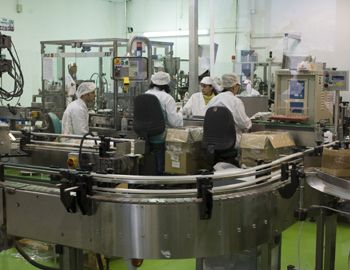 AHAVA produces cosmetics based on the Dead Sea’s high-mineral-content |
Israel enables entrepreneurs in Israel to exploit the area’s resources. The Ahava cosmetics firm, in Kibbutz Mizpe Shalem, produces products from the high-mineral-content mud of the northern Dead Sea.
An Israeli quarry next to the settlement Kokhav Hashahar produces building materials. Also, Israel has established facilities in the Jordan Valley for treating wastewater and for burying waste from Israel and from settlements.
International law prohibits the establishment of settlements in occupied territory and exploitation of the resources of occupied territory.
B'Tselem calls on Israel to evacuate the settlements, to enable Palestinian access to all the lands that have been closed to them, and to allow them to use the water sources for their purposes. In addition, Israel must remove the restrictions on movement in the area and enable construction and development in the Palestinian communities.
Israel must also close down the enterprises that profit from the minerals and other natural resources in the area, and it must also shut down the facilities for disposal of Israeli waste.
This article was first published by: btselem.org
Articles for May 12, 2011 | Articles for May 13, 2011 | Articles for May 14, 2011





Quick Links
DINING
Willamette UniversityGoudy Commons Cafe
Dine on the Queen
Willamette Queen Sternwheeler
MUST SEE SALEM
Oregon Capitol ToursCapitol History Gateway
Willamette River Ride
Willamette Queen Sternwheeler
Historic Home Tours:
Deepwood Museum
The Bush House
Gaiety Hollow Garden
AUCTIONS - APPRAISALS
Auction Masters & AppraisalsCONSTRUCTION SERVICES
Roofing and ContractingSheridan, Ore.
ONLINE SHOPPING
Special Occasion DressesAdvertise with Salem-News
Contact:AdSales@Salem-News.com
Terms of Service | Privacy Policy
All comments and messages are approved by people and self promotional links or unacceptable comments are denied.
Anonymous May 13, 2011 11:04 am (Pacific time)
This scenario written in this article, is the exact same thing, that the owners of israel are doing to the U.S. 10 million more acres taken by federal government, they signed legislation to own all the water, (even ponds), they signed legislation to own all farms and food, swat teams going after the almish for selling organic milk, new legislation passed that police can enter your home for any reason, (end of the 4th ammendment), the U.S. education system, and the media all controlled by those who own israel, etc. etc. etc. Tim, you do a great job in regards to the israel palestine issue, but its happening here, right in front of our eyes. People like you and I, that are for the Bill of Rights, well, those days are over..The only reason you are not feeling the total effects of it, are because its in the works throughout the country, building momentum. (coming to a town near you) The Christians, those that love liberty, those that support the bill of rights? we are now Palestinians.
[Return to Top]©2026 Salem-News.com. All opinions expressed in this article are those of the author and do not necessarily reflect those of Salem-News.com.